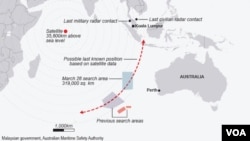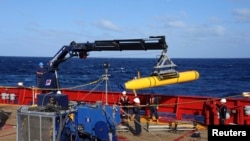BANGKOK —
Chinese planes have spotted objects in the Indian Ocean bearing the same colors as the missing Malaysia Airlines jet.
Investigators, however, say those objects and others that have been pulled from the water cannot be confirmed as debris from the jet.
Vessels from six nations, including China and Australia, scoured the southern Indian Ocean Saturday in stepped-up efforts to locate a missing Malaysian jet 21 days after it disappeared on a flight to Beijing. Malaysia's acting transport minister, Hishamuddin Hussein, is trying to reassure families of the missing passengers and crew that the international team deployed on the sea and in the skies remained committed to the search.
With the search for missing Malaysia Air Flight 370 now entering its fourth week, Hishamuddin Hussein says all 26 nations involved remained committed to the task despite the frustrating lack of any definite evidence showing what happened to the plane. The search currently is centered about 1,600 kilometers southwest of Perth, Australia, in the Indian Ocean's Southern Corridor — a band of open water circling the globe where high winds and waves are common.
On Saturday during an emotional meeting with families of the passengers and crew from flight MH370 Hishamuddin reassured relatives there would be no let-up in the search.
"They know that it's not just a Malaysian effort; it's a global effort. They know [the search is] in the Southern Corridor. Australia is taking the lead. We've got the latest P8 Poseidon and Orion [planes] up there. We've got a Chinese aircraft — the latest, never seen outside the [country] before — landing in Perth; 26 nations working together," he said.
Australia's Maritime Safety Authority said eight aircraft flew over the search area Saturday, including a Chinese Air Force Ilyushin IL-76, three Australian air force P3 Orions and aircraft from Japan and New Zealand.
The new search area followed "credible leads" of a possible crash site for the Boeing 777 jetliner, based on new data showing the plane had been traveling faster than earlier estimated, so it would have exhausted its fuel supply sooner and if — as is now believed — it plunged into the sea late early on March 8.
As six or more ships began traveling through the new search area Saturday, the Chinese news agency Xinhua said spotters aboard Chinese planes sighted three objects bobbing in the water near each other — one white, one red and one orange — that could be from the Malaysian airliner. The current search area has an overall size of 319,000 square kilometers.
Malaysia's Hishamuddin says there is little to no hope that anyone survived the plane's plunge into some of the most desolate waters in the world's oceans, but that he pledged to the families that the search would go on, and that he would "hope against hope" for positive results.
"They said that no matter how remote — hope against hope — please will you continue to [search for] survivors," he said. "And I have said that from the beginning that no matter how remote, I'm always hoping against hope and I'm praying, and the [search and rescue] is also, in any remote manner, has always been to find for survivors."
Story continues below photo gallery:
The flight from Kuala Lumpur had 239 passengers and crew on board — more than half them Chinese — when the jet mysteriously veered off its flight path and both of its transponders were deliberately shut off.
Without the data that transponders routinely supply, the search has relied on satellite technology — position estimates gathered by triangulating "pings" transmitted by the Boeing jet's engines — and further data analysis.
On Sunday, the Australian navy vessel Ocean Shield will take on board a towed pinger locator and a submersible drone, with American military personnel to operate them. The team hopes to capture signals from flight recorders aboard Flight MH370 before the batteries powering those devices are exhausted.
Some information for this report comes from AP.
Investigators, however, say those objects and others that have been pulled from the water cannot be confirmed as debris from the jet.
Vessels from six nations, including China and Australia, scoured the southern Indian Ocean Saturday in stepped-up efforts to locate a missing Malaysian jet 21 days after it disappeared on a flight to Beijing. Malaysia's acting transport minister, Hishamuddin Hussein, is trying to reassure families of the missing passengers and crew that the international team deployed on the sea and in the skies remained committed to the search.
With the search for missing Malaysia Air Flight 370 now entering its fourth week, Hishamuddin Hussein says all 26 nations involved remained committed to the task despite the frustrating lack of any definite evidence showing what happened to the plane. The search currently is centered about 1,600 kilometers southwest of Perth, Australia, in the Indian Ocean's Southern Corridor — a band of open water circling the globe where high winds and waves are common.
On Saturday during an emotional meeting with families of the passengers and crew from flight MH370 Hishamuddin reassured relatives there would be no let-up in the search.
"They know that it's not just a Malaysian effort; it's a global effort. They know [the search is] in the Southern Corridor. Australia is taking the lead. We've got the latest P8 Poseidon and Orion [planes] up there. We've got a Chinese aircraft — the latest, never seen outside the [country] before — landing in Perth; 26 nations working together," he said.
Australia's Maritime Safety Authority said eight aircraft flew over the search area Saturday, including a Chinese Air Force Ilyushin IL-76, three Australian air force P3 Orions and aircraft from Japan and New Zealand.
The new search area followed "credible leads" of a possible crash site for the Boeing 777 jetliner, based on new data showing the plane had been traveling faster than earlier estimated, so it would have exhausted its fuel supply sooner and if — as is now believed — it plunged into the sea late early on March 8.
As six or more ships began traveling through the new search area Saturday, the Chinese news agency Xinhua said spotters aboard Chinese planes sighted three objects bobbing in the water near each other — one white, one red and one orange — that could be from the Malaysian airliner. The current search area has an overall size of 319,000 square kilometers.
Malaysia's Hishamuddin says there is little to no hope that anyone survived the plane's plunge into some of the most desolate waters in the world's oceans, but that he pledged to the families that the search would go on, and that he would "hope against hope" for positive results.
"They said that no matter how remote — hope against hope — please will you continue to [search for] survivors," he said. "And I have said that from the beginning that no matter how remote, I'm always hoping against hope and I'm praying, and the [search and rescue] is also, in any remote manner, has always been to find for survivors."
Story continues below photo gallery:
The flight from Kuala Lumpur had 239 passengers and crew on board — more than half them Chinese — when the jet mysteriously veered off its flight path and both of its transponders were deliberately shut off.
Without the data that transponders routinely supply, the search has relied on satellite technology — position estimates gathered by triangulating "pings" transmitted by the Boeing jet's engines — and further data analysis.
On Sunday, the Australian navy vessel Ocean Shield will take on board a towed pinger locator and a submersible drone, with American military personnel to operate them. The team hopes to capture signals from flight recorders aboard Flight MH370 before the batteries powering those devices are exhausted.
Some information for this report comes from AP.
We are sorry, but this feature is currently not available






